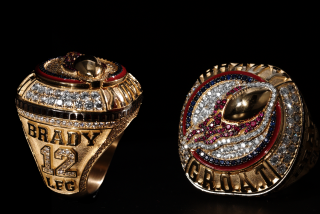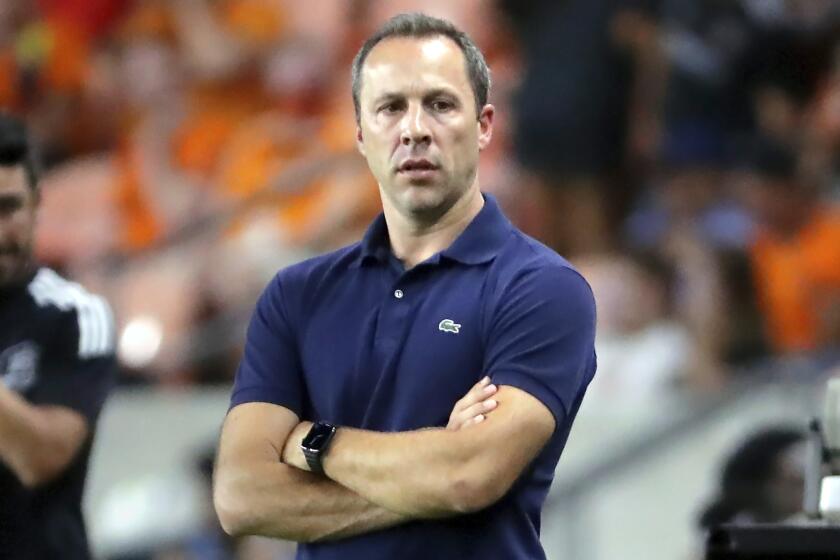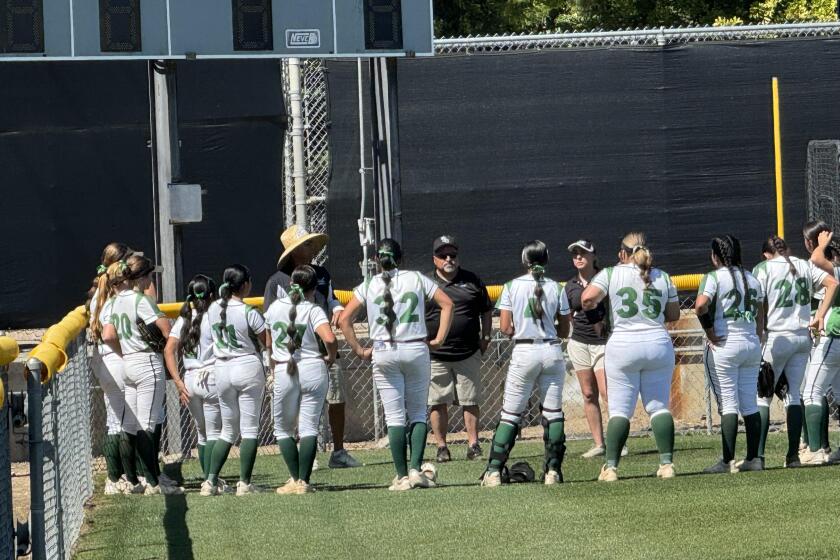Wyche’s Wacky World : Some Say Bengal Coach Has Cracked During 1-10 Season, but He Says It’s Business as Usual
The problem is that Sam Wyche’s life is a no-huddle offense, an open assault on the senses. Wyche is a clear target in a business that reveals human foibles at midfield on national television. And the psychoanalysts frequently are three men in a booth, with microphones.
As if the pressures of NFL coaching weren’t enough, Wyche insists on being a sensitive, complex man who immerses himself in the issues of the day: women’s rights, the homeless, the ozone layer.
Last month, his Cincinnati Bengals winless, Wyche ordered the local pollution control department down to his team’s practice facility, convinced that emissions from the neighboring Queen City Barrel Co. were above acceptable levels.
The emission levels were fine. What smelled was Wyche’s team.
Some coaches go an entire career without tackling urban blight. Washington’s Joe Gibbs, for example, exists quite well in a football vacuum, claiming once to have never heard of Oliver North while Senate gavels were pounding down the street during Iran-Contra hearings.
Gibbs, though, won two Super Bowl titles in the 1980s. Ralph Nader and Sam Wyche combined for none.
Wyche is weird. Wyche is wonderful. Wyche is everything to all people. The conflict is that coaching in the NFL is ulcer-inducing on its own without the coach having to worry about spotted owls.
Wyche, 46, wants a stake in all things considered, yet there remain but 24 hours in a day and eventually the pressure builds and builds until, finally, it blows, like steam through 100 calliopes.
An amateur magician, Wyche could somehow keep 20 plates spinning simultaneously through winning seasons. But this year, they crashed all at once during a Monday night game Oct. 21. The Bengals were playing the Buffalo Bills when the incident was played out before the cameras of ABC.
Bill Walsh, former San Francisco 49er coach and Wyche’s mentor from years back, watched his friend and worried.
“I do think he was on the edge of having an emotional trauma, in a sense,” said Walsh, who left the rigors of coaching for the television booth.
Wyche, though, has been close before.
In 1988, the year after a strike-torn 4-11 season, he was kept on as coach only after Paul Brown, the Bengals’ late owner, insisted that Wyche leave the office by 8 p.m. each day and re-introduce himself to a stranger--his bed. And Brown wasn’t exactly a punch-the-clock kind of guy.
Then in January of 1989, Wyche came within 34 seconds of a Super Bowl title--losing to Walsh’s 49ers, 20-16, and the Sammy Steamer chugged off again, last season plowing through the women-in-the-locker-room issue in the wake of Boston Herald sportswriter Lisa Olson’s ordeal with a few New England Patriots.
Wyche was defiant in standing up to a commissioner’s fine of $28,000, the largest on record, for violating the league’s policy on open locker rooms. Supporters, most of them women, sent Wyche $45,000 to pay the fine.
He paid the fine himself and gave the money sent in to charity.
And after a game against the Rams, he donned an anatomically detailed loin-cloth towel to make a point, lapping up the resulting publicity.
In his spare time, he raised money to help the homeless in Cincinnati’s Over-the-Rhine district.
Maybe Sam Wyche needs a huddle. He bared his soul that Monday night in October, and it wasn’t pretty. He stalked the sidelines in a rage. When Buffalo receiver James Lofton wasn’t called for offensive pass interference on a touchdown reception, Wyche’s wheels came loose.
He stormed the field, pursuing the officials, arms flailing. He screamed at Jim Anderson, one of his assistants.
And after his team (now 1-10) had endured its seventh consecutive defeat, Wyche defied NFL policy and blasted the officiating in a postgame interview with ESPN.
Wyche, however, maintains that he never lost control that night, blaming the unfavorable national attention on the comments of ABC’s Monday night broadcasting crew of Al Michaels, Frank Gifford and Dan Dierdorf.
“There’s nothing going on,” Wyche said later. “There is no disarray, other than the phrase thrown around by some commentators who were watching. They saw it differently, reported it differently, and that’s the way the public will spit it back out.”
But what about the closing minutes of the game, when Wyche shook hands with all of his players, as if bidding them farewell?
“I do it after every game,” he said. “ABC just picked it up. Sometimes those color commentary people become more entertainers than commentators.”
And what about Wyche’s charging onto the field after Lofton’s touchdown catch?
“Well, that call did upset our ballclub, no question,” he said. “I had one player who I thought was going to go after an official. In fact, he was en route, and I went out to grab that player to tell him to calm down and get back on the sideline.”
Wyche said that referee Dick Hantak actually thanked him for possibly preventing an ugly scene.
Uglier than what?
What about Wyche screaming at Anderson?
“We were screaming and hollering at each other about what we felt was a bad call,” Wyche insisted. “Jim Lofton shoving our defender down and no offensive interference called. We were both yelling about what a lousy call it was, and the commentary was that I was yelling at Jim. I yell at Jim a lot, as well as every other coach on this staff.
“There are no back rooms to step into to discuss things during a game. There is immediate reaction on the sideline and, in front of 80,000 people, you can’t whisper. But that particular incident wasn’t even an argument.”
Why, what did everyone else see?
Something was going on, all right. The next week, Wyche appeared almost mummified on the sideline during a blowout loss to the Houston Oilers.
This, apparently, was Wyche’s pouting stage. Bengal General Manager Mike Brown had reportedly chastised Wyche for his behavior in Buffalo. And at an NFL owners’ meetings in Dallas on Oct. 23, Commissioner Paul Tagliabue had issued a strong rebuke to coaches about criticizing officials. No names were mentioned. Tagliabue didn’t need to specify.
Then, finally, the skies cleared for a moment three weeks ago when Eric Thomas blocked Cleveland kicker Mike Stover’s potential game-winning field goal on the last play of the game, preserving Cincinnati’s first--and only--victory, 23-21.
Instead of basking in the afterglow, though, Wyche, more sarcastic than ever, lashed out again at the officiating.
“I could not believe what I saw on the field today with those seven guys,” Wyche said. “I’m not criticizing them. I’m just telling you, I couldn’t believe it. Now that could be that they did an unbelievably good job, or that they didn’t.”
Wyche, himself accused by Cleveland coaches of pregame espionage, set sail on a rambling monologue about how the Browns used to plant microphones in their uniforms to illegally record opposing signals; how the Browns were caught red-handed but the NFL swept it under the rug to protect Cleveland owner Art Modell, a key negotiator in the league’s precious television contract.
The inference: Wyche thinks the NFL is conspiring against him because he is controversial and unconventional.
Wyche, in episodes such as these, comes off as a modern-day Captain Queeg.
Of the NFL, Wyche said: “Anything new is like change. It’s resisted to the hilt.”
In most ways, Wyche is everything the NFL is not: fresh, candid, innovative, opinionated. His no-huddle offense jump-started the modern game and has since been copied and mastered by the Bills.
In other ways, though, Wyche reminds of the petulant schoolboy who almost begs for a trip to the principal’s office.
Wyche had his supporters in his stance against women in the locker room, but the league’s access rules had been on the books for years before Lisa Olson’s incident, so why did Wyche wait for the most opportune time to go public?
Critics maintain that Wyche still doesn’t get it, that he ignorantly confused equal access with sexual harassment, which is what the Lisa Olson case was all about.
Wyche, again, his job and stability perhaps in the balance, is trying the patience of all concerned, including his own general manager.
After the most recent outburst against the officials, Brown told the Cincinnati Enquirer, “It gets you nowhere, and it’s worse than a waste of effort. It’s better if you say very little.”
The NFL is staring down Wyche with a menacing eye. Another fine seems almost certain if Wyche persists, although he denied Wednesday that he had been assessed $7,500.
“We’re not going to have any comment about Sam Wyche on this issue,” league spokesman Greg Aiello said. “We’re aware of his comments. It will be dealt with internally. It will be handled.”
Wyche-watchers think his actions suggest that he’s almost looking for an excuse to get fined or fired. Maybe that’s the easiest way out.
Even his friend, Walsh, says the distractions Wyche creates are counterproductive. Every coach needs his outlet. Before turning the 49ers into a power, Walsh endured an eight-game losing streak in 1980.
To get through the tough times, Walsh said, he played tennis until he was so exhausted he almost collapsed into sleep.
“By the time we got the eighth loss, I was a basket case, too,” Walsh said. “I think any coach that’s reasonably sensitive, and reasonably intelligent, is going to feel it a lot more than a coach who might not realize how bad it is.”
Walsh says Wyche relieves his tensions by creating distractions.
“It might be a release for Sam without him realizing it,” Walsh said. “A subconscious release to do those other things, to take his mind off the pressure of getting his job done.
“But any behavior pattern you have that takes energy away from coaching itself is divisive and limits what you can do and reduces your capabilities. I’ve spoken with him before. There is only so much energy and thought process he can offer, and every bit of it should go toward plotting out the best way to win.”
Walsh knows Wyche as well as anyone, having been Wyche’s quarterback coach when Wyche was playing for the Bengals in the late 1960s.
Then in 1979, Walsh hired Wyche as quarterback coach for the 49ers after Wyche had been turned down for a high school coaching job. The four years with the 49ers, tutoring Joe Montana, became Wyche’s springboard to prominence.
He coached one season at Indiana University in 1983, then was hired by the Bengals in 1984.
Walsh has been in frequent contact with Wyche recently, out of concern.
The noose seems to be closing fast, though. Critics maintain that Wyche’s distractions are somehow contrived to divert attention from his inadequacies as a coach.
His record in Cincinnati is 62-64. And after another in that series of early season defeats last month, Wyche proclaimed that there were more important things in life.
“There’s golf to be played and tennis to be served and other things to be done out there beyond worrying about a friggin’ football game,” he said.
Yet, it is Wyche who exhausts himself in the pursuit of football success.
“I think he’s a hypocrite, basically,” said Andy Furman, a controversial talk-show host on Cincinnati radio station WLW. “He says winning is unimportant. I can live with that. But don’t say it when you’re 0-5. Say it when you go to the Super Bowl. I think he’s crazy. He needs to get away from the game.”
Furman said that Wyche is calling sponsors in an effort to get them to stop advertising on Furman’s show. Furman also said that Wyche is a self-indulging man who is posturing himself for a future in television.
“He’s probably the most marketable sub-.500 coach in the history of sports,” Furman said. “He’ll probably go to the booth if he gets fired next here. He’s become bigger than the team, story-wise.”
Bengal players, though, swear by Wyche. They don’t hold him responsible for the team’s pitiful season.
“Personally, I love the guy,” quarterback Boomer Esiason said. “I’d go through the wall for him.”
Pro Bowl guard Max Montoya, a former Bengal who plays for the Raiders, said Wyche is often misunderstood.
“He is very complex,” Montoya said. “I think people sometimes take what he says out of context. But he’s a very good coach, a very innovative coach who gets along well with players.”
Walsh says the Bengal organization has to take some of the blame for the team’s collapse because it has failed to improve the roster. The Bengals, notoriously tightfisted, have signed only three Plan B free agents in three years.
“The team has been eroding, talent-wise, to the point where they were an 0-8 team,” Walsh said.
Wyche’s job is not believed to be in immediate danger. The victory over archrival Cleveland certainly helped his cause. And he has two years remaining on a contract that pays him about $450,000 annually. The Bengals are not eager to eat that big a chunk.
The team is hoping for a strong finish and a quick turnaround, a la 1987, when the Bengals went 4-11 one season, then to the Super Bowl the next.
“I think Mike Brown will not, as opposed to some owners around the league, look at the scoreboard and the win-loss record to decide the intelligence and effectiveness of the coach,” Wyche said. “If the coach is not the problem, he won’t make a change there. I don’t think that is his thinking at the moment. But the season’s not over. We can screw this thing up just yet.”
Brown did not return several phone calls regarding Wyche.
Wyche certainly doesn’t need the work. He is independently wealthy, thanks to a sporting goods store he opened in Greenville, S.C., when his playing days ended in 1976. It has since grown to an 11-store chain.
So why does he put up with the aggravation?
Perhaps even he doesn’t know.
“I don’t even read our local papers,” Wyche said. “I even pump my own gas at the self-serve. I go inside and pay for it. Right now, when you’re losing, you don’t want to talk to anybody.”
The sentiment around town is that perhaps Wyche should leave coaching, for his own good.
It is a suggestion Walsh does not dismiss.
“We’ll have to watch and see,” he said. “I don’t think it should be this year. I don’t think he’d want to live with this record. I think they can regroup, have a good draft, and come back and have a heck of a year. . . . I think he now has a better grasp of things.”
Some suggest that the death of Paul Brown, the Bengals’ owner, on Aug. 5 has had more effect on Wyche than he lets on. If Walsh is Wyche’s older-brother influence, Brown was father figure. Wyche used to sit next to Brown on bus rides to games.
Although he played in the pros for nearly 10 years with five teams, Wyche was never much of a quarterback. He made it the hard way, climbing the ladder from tiny Furman University in South Carolina. He signed with the Bengals as a free agent in 1969, but Brown was more impressed with Wyche’s playbook than his arm.
Wyche kept meticulous notes and his binder was well organized. Brown kept the playbook, as he did with those of others he thought showed promise, and referred to it later when he hired Wyche as Bengal coach in 1984.
After the Bengals sank to 0-8, Mike Brown, Paul’s son, received a letter that read: “Thank God your father didn’t live to see this.”
Esiason is convinced that Paul Brown returned to Riverfront Stadium three weeks ago to spare Wyche another agonizing defeat. Cleveland, trailing by two, had several chances to win the game in the last five minutes when:
--Browns’ tailback Kevin Mack fumbled at the Bengal 19.
--Kicker Mike Stover’s 47-yard field goal attempt hit the left upright.
--With less than a minute left, sure-handed receiver Brian Brennan dropped a certain touchdown pass.
Wyche also made another questionable coaching decision in crunch time, one that would have haunted had Stover made the field goal. With less than two minutes left, the Bengals had the ball at their 30 and Cleveland had two timeouts remaining.
Wyche, inexplicably, called a pass on first down, a simple flare to tight end Eric Kattus. But Kattus dropped the ball, stopping the clock, which gave the Browns an additional 30 seconds for a comeback.
The Browns needed every second.
But on the last play, Wyche’s future perhaps on the line, Thomas swept in from the left side and blocked Stover’s 35-yard attempt as time expired.
“When we got into the locker room, someone said that PB (Paul Brown) was watching,” Esiason said. “Maybe it was the gust of wind at the end. Or the extra energy he gave Eric Thomas. . . . It just felt like PB was there for some reason. It was kind of eerie.”
Maybe it was one last gift from Brown. Some would say Wyche should count his blessings and get on with his life.
Think of the good Wyche could do with no officials and a full night’s rest.
“Yeah,” cracked radio man Furman. “He should join the Peace Corps.”
More to Read
Get our high school sports newsletter
Prep Rally is devoted to the SoCal high school sports experience, bringing you scores, stories and a behind-the-scenes look at what makes prep sports so popular.
You may occasionally receive promotional content from the Los Angeles Times.







